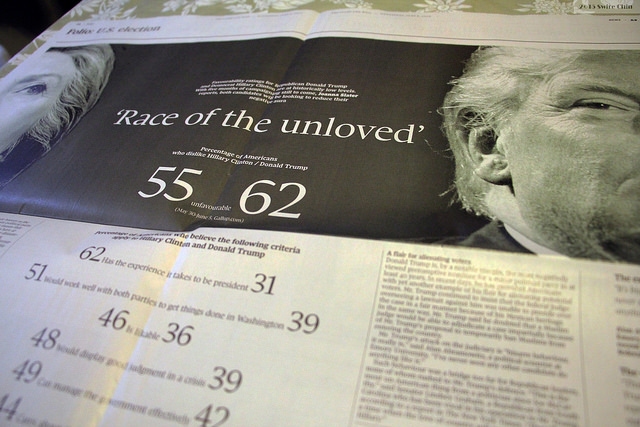
The US presidential election on 8 November could have grave implications for Australia’s security. The next US president may retreat into international isolationism.
If President Trump wins there could well be serious consequences for our crucial alliance relationship with America and for our regional security partners, such as Japan. A President Clinton would be preferable for Australia in foreign and defence policy terms, but she'll have a major battle on her hands at home with the economy and a dysfunctional Congress.
Both presidential candidates have serious personality shortcomings. Neither of them is well liked by the American people. The opinion polls are showing them to be neck and neck. Much will depend upon the voter turn-out on Election Day in a country where voting isn't compulsory.
If Clinton is elected, her foreign and defence policies in terms of using US power and standing up to Russia and China may be more decisive than those of her predecessor, Barack Obama. But Clinton’s priority will be to repair damage domestically to the institutions of government and this will mean an inward looking America.
The centre of gravity of US opinion has been shifted by the Trump candidacy and there will be an enduring effect politically, even if he loses. There's anger about state of the economy, the damage to traditional jobs caused by countries such as China, and yawning gaps in standards of living.
A President Trump may prove to be an isolationist and a destroyer of alliances. Former US Secretary of Defense, Robert Gates, describes Trump as unqualified and unfit to be commander-in-chief.
He says that Trump is stubbornly uninformed about the world and 'temperamentally unsuited to lead our men and women in uniform'.
Some 50 national security and foreign policy officials, who served in Republican administrations dating back to President Nixon, have also
issued a statement describing Trump as lacking self-control and acting impetuously. They state that Trump 'has alarmed our closest allies with his erratic behaviour'.
Canberra will be relieved if the election in November results in Hillary Clinton becoming President of the United States. She's well known in official circles in Canberra from her time as Secretary of State. She'll be seen as reassuringly orthodox and American foreign policy will hopefully be reset to 'normal'. She'll be expected to support robust alliances and intervention in important instances when the US led global order is challenged.
However, whether she'll rebuild a strong US military and support free trade, as distinct from protectionism, remains to be seen. There may be modest hope that the Trans-Pacific Partnership (TPP) agreement could be rescued through a deal in which congressional opponents get some compensation outside the scope of TPP, but that's a long shot.
Clinton would be the more reliably sensible and policy trustworthy president from Australia’s perspective. Importantly, the pivot or rebalance of the US presence in Asia was essentially an idea that she and Kurt Campbell came up with. Campbell is likely to be influential in a Clinton administration.
The implications of a Trump administration are much more difficult to predict. But one thing is certain: he's determined to make radical changes in how Washington is governed and to rebuild America and 'make the US strong again'. He stresses the need to build jobs, reject free trade and immigration, and make US allies (including Japan and South Korea) pay more for their defence. That's not good news for Australia.
Former Australian ambassador to Washington, Kim Beazley, asks where Australia is to begin to work with a victor in the presidential race who has trashed the the alliance system and liberal international rules-based order that have underpinned American leadership since 1945 during the campaign.
Others have confidence that the US constitutional system of checks and balances will counter Trump’s worst excesses. However, a US President has many powers to mount negative initiatives. He can undermine confidence among allies that he'll initiate actions to support them, and he can use the broad license of US trade laws that give an American president powers to pursue punitive action against trade partners.
If Trump wins, it'll be crucial from an Australian perspective to immediately bring our concerns to bear with the new administration. That should focus on the critical nature of our alliance with the US and the importance of American commitment to a forward military presence in Asia. But we also need to think through a worst-case contingency that involves the very future of the ANZUS alliance and our trust in America. The potential for a disaster in the relationship shouldn't be dismissed.
Regardless of who wins, we'll see more intense polarisation in Washington and continuing savage political struggles. That'll make it more difficult for a middle-sized power like Australia to gain traction. Our life will be harder.
 Print This Post
Print This Post